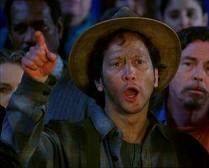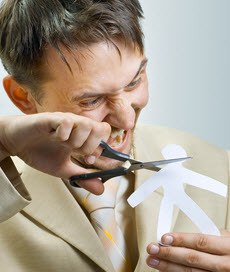Random Thoughts
by Dave Landry
I hate stocks. Now before you read into that statement, read further.



I used to love stocks. Stocks in my portfolio were my little darlings. I’d nurture them along giving them encouragement, often saying “You Can Do It!” in my best Bela Karolyi voice (although since I'm a Coonass, many would say that I sound more like the Townie from Waterboy). Now, I’m not so nice. I take more of a: look, you’re here as long as you perform, when that ends, see ya!
Treat Your Stocks As You Would Your Employees

You have to look at your stock portfolio as your little employees. If you had one employee that was performing well, doing the majority of the workload, would you fire him because he is due to stop working? If you have another employee that was sitting on his buttocks and a waste of oxygen, would you keep him, thinking that today’s the day he will start working? (And, what would the world be without hypothetical questions?-Wright) The answer is blatantly honest. However, with stocks people do just the opposite. As a client recently said, before viewing stocks as employees, “I used to treat my portfolio like children.” And obviously, with children, with anything short of mass murder you don’t give up.
Be A Trading Tyrant

With stocks, you have to be a tyrant. Whenever a stock enters your portfolio, his days are numbered. As soon as performance drops, he’s out. You do this whether there’s a new candidate waiting in the wings or not. If there are no viable candidates, then his slot is not filled, at least not immediately. It’s nice knowing that unless there are some possible new “employees” with stellar potential, you don’t have to hassle with “employees.” True, it’s tough to make much money without them, but it sure beats losing money. Sometimes return of capital is more important than the possibility of return on capital. Your job is to constantly seek out new employees knowing that you will be getting rid of old ones eventually.
Judging A Stock's Performance

So how do you judge performance? Simple. You have a stop in place. Except in some occasional cases where a tiny bit of discretion is required, there's often not much to do. Trading, done properly, is often boring. If the stop is hit, the stock is eliminated. It is that simple.* You don’t wait another day, and then another day….. If it continues to sink, don't think, stay, and pray. And, worse, don’t buy more. Don’t sweat, don’t fret, just be a hard ass boss from the start. I actually take a mild enjoyment when I kick a stock out of my portfolio. I will often say, see ya and the horse you rode in on! (F-bombs implied). Sometimes, I channel Paul Giamatti as John Adams and shout "I said good day sir!"
*Note: This is not to imply that a position should be exited when it becomes so-called "dead money" by trading sideways. Sometimes moves take time to develop. If the stop is hit, you quit. Otherwise, let nature take its course.
Holding And Hoping Hurts Your Performance, And You
You waste a lot of unnecessary energy worrying over an under performing portfolio that has exceeded your risk parameters long ago. This will take its toll on you. You won’t see the next opportunity when it presents itself. You’ll be too consumed with something that you should have taken care of a long time ago. I don’t want to philosophize too much (I know, too late!) but this stress will also creep into other areas of your life.

As mentioned before, I once walked into a gym (don't laugh, I haven't missed an annual workout in years) with a long face. The perky receptionist asked,"what's wrong!?" in a voice one octave above normal. I replied that I was in a bunch of bad stocks. She immediately quipped back in a high pitched happy voice "Well sell 'em and buy some good ones!" I walked away with a grimace, thinking, I have an MBA and a degree in Computer Science. What does SHE know about trading!? Apparently, a lot!
As another example, back in the glory days of '99 everyone was printing money. I became friendly with a trader who traded at a lot of the same markets as me. We were on the phone once and I asked him if he was enjoying the ride. He explained to me that "he was nursing some bad positions." I'm not exactly sure how you "nurse" a position and I certainly don't want a visual. The point is, in the greatest bull market in history, he was hoping his stocks would come back. He let opportunity pass him by because he was unwilling to give up on his "children."
Why Do We Hold And Hope?
In my journey to understand why trading is so hard, I've studied a lot of psychology and a little neurology. My epiphanies have come slowly, but surely. As I learn more and more, I began to realize that we're not made to trade from both a psychological level and a physiological level. I've learned to do the right thing even though it feels uncomfortable and unnatural. And, then later learn why this is so. Do the hard thing first-e.g.,honor thy stop--and just realize that they "whys" or more accurately, the "wise" will come later.
We hold and hope because we tend to be optimist. I was going to be a pessimist but I figured that it wouldn't work out (I think that's Wright). We hold and hope based on previous price "anchors." The price was higher so maybe it will return. The so-called endowment effect(1) also clouds our judgement. The longer we own something, the more attached we become. I have some collectibles lying around here. As we're in the process of downsizing, I'm faced with the decision of packing them up or unloading them. I know that I think that they're worth much more than they really are. A big reason for this is that I've held onto them for so long. The reality is, they're only worth what someone will pay me. The good news is with stocks, what is, is. The current bid is what your stock is worth-nothing more, nothing less.
In Summary
You must treat your stocks like employees, not your darling little children. You can't hold and hope. When the time comes, you have cut 'em loose. When trading, be a tyrant.
1. See Thinking Fast And A Slow, Daniel Kahneman for more on the endowment effect.


